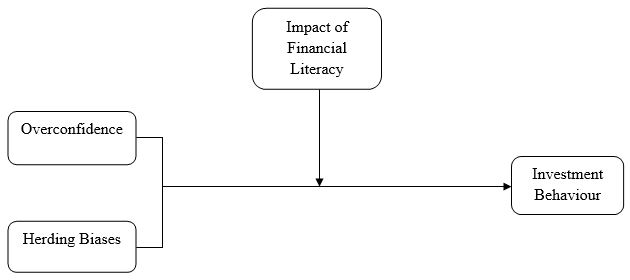Impact of Financial Literacy on Investment Behaviour of Millennial in Developing Countries
DOI:
https://doi.org/10.5281/zenodo.15494185Keywords:
financial literacy, investment behaviour, behavioural biases, overconfidence, herding biasesAbstract
This study has focused on the impact of financial literacy on the investment behaviour of the millennials in developing countries. As economies evolve and grow more complex, the requirement of the financial knowledge has become increasingly significant, especially for the younger generation. This research study has therefore identified how millennials in the developing countries often make some poor investment decisions influenced by the behavioural biases and a lack of financial education. Unlike other individuals in the developed countries who demonstrated higher levels of the financial awareness, many millennials in developing regions, like, South Asia or Africa face several financial instabilities resulting from the inadequate financial skills. Using qualitative secondary methodology, this study has analysed previous literature, reports and case studies to investigate the role of financial literacy in shaping the savings and investment behaviour, key findings highlight that financial literacy positively correlate with the stronger saving-investment habits and negatively correlate with the financial issues. Two major psychological biases, namely, overconfidence and herding can be found to influence the investment choices of the millennials. Furthermore, this study shows that financial literacy can mitigate the effect of these biases, enabling the better decision-making.
A conceptual framework has also been proposed to illustrate the relationship between the financial literacy, behavioural biases and the investment behaviour. The findings suggest that strengthening financial literacy among the millennials can contribute not only to the personal financial well-being, but also it enhances the economic stability within the developing countries. It recommends that financial education at the early stage can increase the investment awareness initiatives to empower the youth with necessary financial decision-making skills. This study further concludes the enhancing financial literacy is the key to foster more rational, informed and sustainable investment behaviour among the millennials within the developing countries.
Downloads
References
Abdullah, D. F. B., Ahmed, Z., Noreen, U., & Ramakrishnan, S. A. L. (2021). What explains the investment decision-making behaviour The role of financial literacy and financial risk tolerance. Afro-Asian J. of Finance and Accounting, 11(1), 1. https://doi.org/10.1504/aajfa.2021.10033830.
Abebe, G., Tekle, B., & Mano, Y. (2018). Changing saving and investment behaviour: The impact of financial literacy training and reminders on micro-businesses. Journal of African Economies, 27(5), 587–611. https://doi.org/10.1093/jae/ejy007.
Ahmed, Z., Noreen, U., Ramakrishnan, S. A. L., & Abdullah, D. F. B. (2021). What explains the investment decision-making behaviour The role of financial literacy and financial risk tolerance. Afro-Asian J. of Finance and Accounting, 11(1), 1. https://doi.org/10.1504/aajfa.2021.111814.
Cahyani, R. N., & Sriyono, S. (2023). Effect of financial literacy, risk perception and financial knowledge on investment decision making generation z with financial behavior as intervening variables. https://doi.org/10.21070/ups.2374.
Chawla, D., Bhatia, S., & Singh, S. (2022). Parental influence, financial literacy and investment behaviour of young adults. Journal of Indian Business Research, 14(4), 520–539. https://doi.org/10.1108/jibr-10-2021-0357.
Choudhary, K., Mehta, S., & Kamboj, S. (2021). Financial literacy, investment behaviour and socio-demographic variables: evidence from India. International Journal of Behavioural Accounting and Finance, 6(3), 1. https://doi.org/10.1504/ijbaf.2021.10038856.
Nurmelia, N., Fadilla, F. N., AR, N. W., & Leon, F. M. (2022). Past behaviour, financial literacy, and investment decision-making process of individual investors. SIMAK, 20(01), 55–79. https://doi.org/10.35129/simak.v20i01.329.
DM, R. (2021). Financial literacy, financial behavior and financial attitudes towards investment decisions and firm bankruptcy. Atestasi : Jurnal Ilmiah Akuntansi, 4(1), 79–87. https://doi.org/10.57178/atestasi.v4i1.167.
Farah, A., Purwanto, B., & Viana, E. D. (2023). The influence of financial literacy and financial inclusion on saving and investment behaviour for millennial generation in DKI Jakarta. TIJAB (The International Journal of Applied Business), 7(1), 73–86. https://doi.org/10.20473/tijab.v7.i1.2023.43436.
Gupta, S. (2023). Financial literacy, Savings and Investment behaviour of IT professionals. Journal of Business Management and Information Systems, 10(1), 26–30. https://doi.org/10.48001/jbmis.2023.1001006.
Hasanuh, N., & Putra, R. A. K. (2020). Influence of financial literacy and financial attitude on individual investment decisions. Advances in Business, Management and Entrepreneurship, 424–428. https://doi.org/10.1201/9780429295348-92.
Hastings, J., & Mitchell, O. (2011). How financial literacy and impatience shape retirement wealth and investment behaviors. https://doi.org/10.3386/w16740.
Kasim, E. S., Awalludin, N. R., Zainal, N., Ismail, A., & Ahmad Shukri, N. H. (2023). The effect of financial literacy, financial behaviour and financial stress on awareness of investment scams among retirees. Journal of Financial Crime. https://doi.org/10.1108/jfc-04-2023-0080.
Khan, S. N. (2016). Impact of financial literacy, financial knowledge, moderating role of risk perception on investment decision. SSRN Electronic Journal. https://doi.org/10.2139/ssrn.2727890.
Krische, S. D. (2019). Investment experience, financial literacy, and investment‐related judgments. Contemporary Accounting Research, 36(3), 1634–1668. Portico. https://doi.org/10.1111/1911-3846.12469.
Lim, K. L., Soutar, G. N., & Lee, J. A. (2016). Factors affecting investment intentions: A consumer behaviour perspective. Financial Literacy and the Limits of Financial Decision-Making, 201–223. https://doi.org/10.1007/978-3-319-30886-9_10.
Marlina, L., Irawati, N., & Siregar, S. M. (2019). Financial literacy, childhood consumer experience, and investment decision in milennial housewives. Proceedings of the 2nd Economics and Business International Conference. https://doi.org/10.5220/0009327205910595.
Owusu, G. M. Y., Ansong, R., Koomson, T. A. A., & Addo-Yobo, A. A. (2022). Savings and investment behaviour of young adults: the role of financial literacy and parental financial behaviour. African Journal of Management Research, 27(1), 75–92. https://doi.org/10.4314/ajmr.v27i1.5.
Owusu, J., Bin Ismail, M., Hassan Bin Mohd Osman, M., & Kuan, G. (2019). Financial literacy as a moderator linking financial resource availability and SME growth in Ghana. Investment Management and Financial Innovations, 16(1), 154–166. https://doi.org/10.21511/imfi.16(1).2019.12.
Rajan, B., Kaur, N., K. Athwal, H., Rahman, A., & P.S., V. (2021). Financial literacy as a tool for stimulating the investment behaviour of rural women: an empirical assessment. Investment Strategies in Emerging New Trends in Finance. https://doi.org/10.5772/intechopen.94532.
Raut, R. K. (2020). Past behaviour, financial literacy and investment decision-making process of individual investors. International Journal of Emerging Markets, 15(6), 1243–1263. https://doi.org/10.1108/ijoem-07-2018-0379.
Ravikumar, T., Sriram, M., Girish, S., Anuradha, R., & Gnanendra, M. (2022). Financial stress, financial literacy, and financial insecurity in India’s informal sector during COVID-19. Investment Management and Financial Innovations, 19(2), 285–294. https://doi.org/10.21511/imfi.19(2).2022.25.
S., Mirosea, N., & Hajar, I. (2023). Effect of financial literacy and behaviour on investment decisions (Study on Southeast Sulawesi investors). KnE Social Sciences. https://doi.org/10.18502/kss.v8i2.12766.
Satoto, S. H., & W. P., S. B. (2019). The effect of financial literacy on financial management behaviour with self-control as intervening variable. Proceedings of the International Conference of Business, Economy, Entrepreneurship and Management. https://doi.org/10.5220/0009960501790186.
Shaik, M. B., Kethan, M., & Jaggaiah, T. (2022). Financial literacy and investment behaviour of IT professional with reference to Bangalore city. Ilomata International Journal of Management, 3(3), 353–362. https://doi.org/10.52728/ijjm.v3i3.487.
Sujenthirai, Bandara, R., & Senevirathne. (2023). Impact of financial literacy and investment skills on investors’ behaviour in Colombo stock exchange – Mediating role of digital literacy. Journal of Accountancy & Finance, 9(2), 313–341. https://doi.org/10.57075/jaf922206.
Widagdo, B., & Roz, K. (2022). The role of personality traits, financial literacy and behavior on investment intentions and family support as a moderating variable. Investment Management and Financial Innovations, 19(2), 143–153. https://doi.org/10.21511/imfi.19(2).2022.12.
Xiao, J. J., Ahn, S. Y., Serido, J., & Shim, S. (2014). Earlier financial literacy and later financial behaviour of college students. International Journal of Consumer Studies, 38(6), 593–601. Portico. https://doi.org/10.1111/ijcs.12122.

Published
How to Cite
Issue
Section
License
Copyright (c) 2025 Tanaya Das, Sulagna Das

This work is licensed under a Creative Commons Attribution 4.0 International License.
Research Articles in 'Management Journal for Advanced Research' are Open Access articles published under the Creative Commons CC BY License Creative Commons Attribution 4.0 International License http://creativecommons.org/licenses/by/4.0/. This license allows you to share – copy and redistribute the material in any medium or format. Adapt – remix, transform, and build upon the material for any purpose, even commercially.









